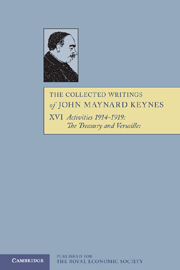5 - THE PEACE CONFERENCE, 1919
from Part II - The Problems of the Peace
Published online by Cambridge University Press: 05 November 2012
Summary
Keynes attended the Peace Conference in Paris as the senior Treasury member of the British delegation and was the official representative of the British Empire on the Supreme Economic Council. He resigned from the Treasury and left the conference when he became disheartened and disillusioned by the terms of the resulting treaty. In the course of time he published three accounts based upon his experiences—The Economic Consequences of the Peace (JMK, vol. II), which appeared in December 1919; ‘Mr Lloyd George: a Fragment’, written as part of The Economic Consequences but suppressed by the author until 1933 when he included it in Essays in Biography (JMK, vol. x), and ‘Dr Melchior: a Defeated Enemy’, published posthumously in Two Memoirs (JMK, vol. xiv). Most of the documents following in this section were written immediately after the events that they describe took place, and Keynes drew upon them for what he published later.
Keynes arrived in Paris for the conference on 10 January 1919. His first discussions were with Norman Davis, chief representative of the United States Treasury, and one of his early communications to Sir John Bradbury concerned their relations. Officially American financial credits were to come to an end with the close of hostilities, foreign loans only being constitutional for war purposes, but the British had already received a credit of $250 million to tide them over the first post-war months and were seeking an additional $500 million-which had been refused both by the Assistant Secretary of the Treasury, Albert Rathbone, and by the Secretary, Carter Glass.
- Type
- Chapter
- Information
- The Collected Writings of John Maynard Keynes , pp. 387 - 474Publisher: Royal Economic SocietyPrint publication year: 1978
- 2
- Cited by



